Technology
The Benefits and Methods of Composting: A Sustainable Solution for Reducing Waste and Enhancing Soil

Composting is an environmentally friendly process that transforms organic materials into nutrient-rich soil enhancers. By recycling kitchen food scraps and yard waste, composting helps reduce waste, combat climate change, and improve soil quality. In this article, we will explore the advantages of composting and different methods you can use to start composting at home.
Advantages of Composting
Composting offers several benefits:
1. Sustainable Waste Management
Composting allows you to recycle food scraps and manage waste more sustainably. By diverting materials from landfills or incinerators, composting helps reduce the emission of powerful greenhouse gases.
2. Cost-Effective Soil Amendments
Composting is a cost-effective way to produce high-quality soil amendments. By reducing the need for fertilizers and pesticides, composting helps save money while improving soil health.
3. Soil Health and Plant Growth
Composting creates nutrient-rich soil that prevents erosion, conserves water, and enhances plant growth. The organic matter in compost improves soil structure, water retention, and nutrient availability.
Methods of Composting
Composting can be broadly classified into two methods: backyard composting and vermicomposting.
Backyard Composting
Backyard composting involves using carbon-rich materials (browns) like dry leaves and nitrogen-rich materials (greens) like grass clippings and food scraps. Here are the steps to start backyard composting:

- Collect browns outdoors and fruit and vegetable scraps in a sealed container in your kitchen.
- Select a well-draining space in your yard for a compost pile and choose a bin type.
- Chop and break down the browns and greens into smaller pieces before adding them to the pile.
- Layer the pile with browns, greens, and water, following the recommended ratio of three parts browns to one part greens.
- Turn and mix the pile with a garden fork to speed up decomposition and aerate the pile.
- Monitor moisture, odor, and temperature, adjusting as needed.
- Cure the compost for at least four weeks before using it in your garden.
- Screen or sift the finished compost to remove undecomposed materials.
Vermicomposting
Vermicomposting uses earthworms to enhance the decomposition process. Here are the steps to start vermicomposting:
- Prepare a container with bedding material like shredded newspaper or cardboard.
- Add organic waste, such as straw, leaves, and kitchen scraps, to the container.
- Introduce earthworms to the container and provide them with a moist environment.
- Monitor the moisture level and add water if necessary.
- Harvest the vermicompost by separating the worms from the finished compost.
Innovative Composting Solutions
Several innovative composting solutions are available to make composting more convenient and efficient:
The ReGreen
The ReGreen is a handheld device that efficiently crushes and pulverizes waste to promote quick biodegradation. It incorporates an aluminum grinder and allows for the introduction of enzymes to speed up composting.
Paradise
Paradise is an automated plant cultivator and compost bin designed to decrease domestic waste. It integrates technology to notify users about compost and plant care needs, making sustainable living feasible for city homes.
KAGURA
KAGURA is a self-sustaining indoor gardening system that facilitates composting and vegetable cultivation. It transforms scraps into compost and nourishes plants with a compact light fixture, making it ideal for urban settings with limited yard space.
Homepost
Homepost is an innovative composting station designed for office environments. It accelerates the composting process, contains odors, and provides additional storage space for diverse organic waste materials.
Reencle
Reencle is an at-home solution for efficiently breaking down household food waste into compost within 24 hours. It features an automatic opening lid, a control panel, and a mechanical churning system to reduce waste volume.
Kamoro's Compost Bin
Kamoro's Compost Bin is crafted with a streamlined airflow design that ensures the effortless cultivation of a healthy compost batch. Its double-walled construction includes a perforated base for airflow and an activated carbon filter to reduce odors.
Composting is a simple and effective way to reduce waste, improve soil health, and contribute to a more sustainable future. By adopting composting practices, you can make a positive impact on the environment and your own garden.
Hello! I’m Roger Jenkins, your go-to source at ReportingTheNews.com. I’m a USC graduate who combines journalistic precision with a Trojan’s passion. Based in sunny Los Angeles, my days are filled with more than just sunshine; they’re about capturing stories that resonate.
Beyond the newsroom, I’m an avid triathlete. Swimming, cycling, and running are more than just sports to me; they embody my commitment to discipline, focus, and a healthy dose of competition.
My love for travel takes me far and wide. Guadalajara, with its vibrant culture and unforgettable tacos, has a special place in my heart. I’m always searching for the next great story or a hidden culinary treasure.
At home, Nala, my energetic pet, is my constant companion. Together, we’re known in our neighborhood for our morning runs and evening strolls.
I’m driven by a belief in the power of storytelling to unite communities. Join me as we explore impactful narratives and stay updated with the latest news. You’ll also get a peek into my sports passions and travel escapades.
Want to get in touch? Follow me on Instagram for more insights and updates.